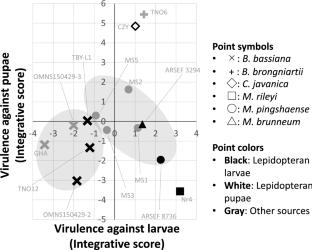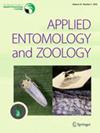Varied selectivity of caterpillar-specific Metarhizium rileyi and generalist entomopathogenic fungi against last instar larvae and pupae of common cutworm, Spodoptera litura (Lepidoptera: Noctuidae)
Abstract
Spodoptera litura (Fabricius) (Lepidoptera: Noctuidae) is a serious pest of crops and vegetables in several Asian areas. Metarhizium rileyi is one of the most promising entomopathogenic fungi for controlling S. litura because of its specificity to lepidopteran larvae; however, little is known about its virulence against last instar larvae and pupae of S. litura although these stages are efficiently controlled by introducing entomopathogenic fungi into the soil. This study aimed to characterize the virulence of M. rileyi strain against the two stages of S. litura by comparing it with 13 strains of entomopathogenic fungi with broad host ranges. In inter-stage virulence comparisons, most fungal strains showed considerably stronger virulence against larvae than against pupae, with M. rileyi Nr4 showing the largest difference. Inter-strain virulence comparisons based on final mortality and mycosis proportion as well as integrative virulence scores revealed that M. rileyi Nr4 was the most virulent against larvae, whereas it was the weakest against pupae, but caused malformation in emerged adults. These results suggest that M. rileyi Nr4 is the most promising for controlling the last instar larvae and is less effective against pupae than the generalist fungi.


 求助内容:
求助内容: 应助结果提醒方式:
应助结果提醒方式:


